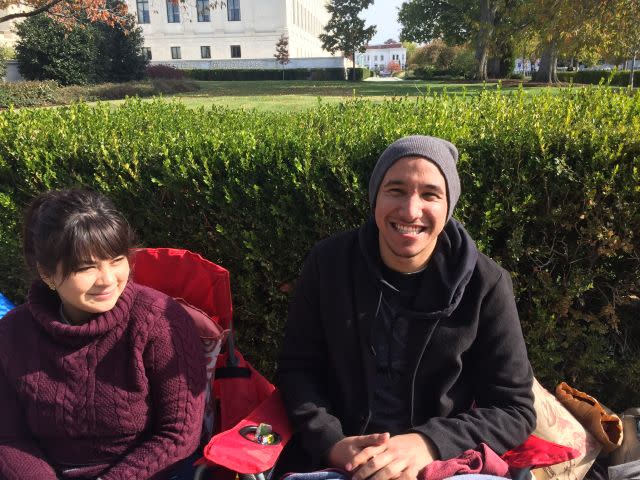Dreamers are hopeful ahead of SCOTUS hearing

Today (Nov. 12), the Supreme Court is hearing oral arguments about an immigration policy that protects Dreamers, young people born abroad and raised in the US without proper documentation.
The Deferred Action for Childhood Arrivals (DACA) program was introduced in 2012 and more than 800,000 young adults who are essentially but not technically American have benefited since, studying, working, and serving in the US military without fear of deportation. Some of those DACA recipients could be found outside the courthouse days ahead of the hearing, hoping to secure a seat for the hearing.
Among them was Juan Hinojos. Born in Mexico, he has spent 19 of his 21 years in the US. Currently, he’s living in DC and interning in Congress for Nanette Barragán, the Democratic representative from the 44th district in California.
“If it wasn’t for documentation, in every other way, I absolutely feel American,” he told Quartz from his perch on a lawn chair outside the courthouse yesterday (Nov. 11), where he was huddled in a hoodie and a hat after a night of camping. “The fact that I’m working in the federal government reflects how much respect, loyalty, and love I have for this nation.”

Juan Inojos and a fellow Dreamer.
Hanging around Capitol Hill, Hinojos is unusually attuned to politics. But he very much hopes that the American public and the high court justices won’t think of the DACA cases before them as a political issue. “It’s about people, not politics. It’s a humanity issue.”
For him and the other DACA recipients, the policy is a lifeline. Their lives and livelihoods, relationships and futures depend on recognition of their difficult circumstances. The immigration status helps them thrive in the place they call home but cannot claim as their own, and new data from a Harvard University study on DACA’s effects in the last seven years show it’s had a “profound impact… on beneficiaries, their families, and their communities.”
Without DACA’s protections, Hinojos could be deported to a country he doesn’t remember, separated from all he knows, and torn from the life he never chose.
The policy is threatened by politics, however.
A DREAM Act deferred
While president Barack Obama’s administration was attempting to pass legislation protecting Dreamers in 2012, called the DREAM Act, it implemented DACA as an interim administrative policy offering young people immediate relief. That policy granted immigration officers discretion to defer deportation for Dreamers who qualified based on their studies, work, or service contributions in the US.
The DREAM Act never passed, however, and under president Donald Trump the administrative policy protecting the youth was rescinded. In 2017, then attorney general Jeff Sessions deemed DACA illegal, saying the policy exceeded executive authority, although this contradicts Trump and his agencies’ otherwise expansive view of presidential power and undermines the authority behind other immigration policies the administration maintains, like deferred action for victims of domestic violence, for example.
Lower courts have already found that the Trump administration’s stated rationale for ending DACA is unsupported, and they have issued injunctions to keep protections in place for those who have already been granted deferments. The high court granted review in three consolidated cases and will decide who is right by the term’s end in spring 2020.
Strong supporters
The Dreamers have some very powerful people and institutions on their side. Apple and hundreds of other American businesses have signed onto briefs urging the court to consider the economic and cultural ramifications of rescinding DACA. They argue that businesses not only rely on Dreamers’ contributions to their enterprises but that the protection’s positive effects on immigrant communities have numerous positive spillover economic effects. Tim Cook, Apple’s CEO, even made the unprecedented move of personally signing the amicus brief that his company submitted to the justices urging them to find DACA is legal, arguing that it was “the moral thing to do.”
Such strong and vocal support from Americans heartens Hinojos, who notes that for many Dreamers, immigration status is a secret, a taboo topic not to be broached. They live a legal nightmare, uncertain how long they’ll be allowed to pursue their American dreams.
Beaming a wide smile and oozing ebullience as he pointed at his fellow campers outside the courthouse, Hinojos concluded, “Usually we don’t talk about it. But here we’re together, a community, and that gives us strength and hope. And we have lots of supporters, all kinds. People are here from across the aisle. There are also Republicans supporting us and lifting the atmosphere. For now, we’re really hopeful.”
Sign up for the Quartz Daily Brief, our free daily newsletter with the world’s most important and interesting news.
More stories from Quartz:
